Winners of the Best Poster Presentation Awards at the SCS Fall Meeting 2023
In collaboration with DSM-Firmenich, SCS offered again the very attractive and prestigious Fall Meeting Best Poster Award program. Combined with the Best Oral Presentation Awards program this is probably the most highly remunerated award program in the field, and we are very proud and happy to cooperate with our sponsoring partners. We wish to express our sincere gratitude to DSM-Firmenich for their generous support and congratulate all winners for their fantastic contributions.
![]() Dr. Jonathan Medlock, Laboratory Head of Process Research, awarded a total of 24 winners at the end of the SCS Fall Meeting 2023 on August 25, 2023.
Dr. Jonathan Medlock, Laboratory Head of Process Research, awarded a total of 24 winners at the end of the SCS Fall Meeting 2023 on August 25, 2023.
Winners of the Best Poster Presentation Awards 2023
| Analytical Sciences | |
| Winner | Nora Bernet, Eawag Dübendorf/ETH Zürich |
| Runner-up | Michael Hofstetter, ETH Zurich |
| Catalysis Sciences & Engineering | |
| Winner | Alessandro Walker, ETH Zurich |
| Runners-up | Sven Thomas Nappen, ETH Zurich |
| Kazutaka Sakamoto, ETH Zurich | |
| Computational Chemistry | |
| Winner | Sophia Johnson, EPFL Lausanne |
| Runner-up | Gabriel Laude, ETH Zurich |
| Chemistry and the Environment | |
| Winner | Sarah Partanen, Eawag Dübendorf |
| Inorganic Chemistry | |
| Winner | Alessandra Logallo, University of Bern |
| Runners-up | Daniel Käch, ETH Zurich |
| Giacomo Rigoni, University of Bern | |
| Medicinal Chemistry | |
| Winner | Sebastian Sjöström ETH Zurich |
| Runner-up | Krittapas Jantarug , Univ. of Zurich |
| Chemical Biology | |
| Winner | Héloïse M. Bürgisser, Univ. of Zurich |
| Runner-up | Daniel Richter, ETH Zurich |
| Organic Chemistry | |
| Winner | Emma Robert, EPFL Lausanne |
| Runners-up | Anthony Fernandes, Univ. of Bern |
| Andrea Geraci, University of Basel | |
| Physical Chemistry | |
| Winner | Meghna Manae, ETH Zurich |
| Runners-up | Federico Cambiè, PSI |
| Mateusz Suchodol, EPFL Lausanne | |
| Polymers, Colloids & Interfaces | |
| Winner | Kangwei Chen, University of Zurich |
| Runner-up | Ilaria Onori, University of Fribourg |
| Jan Thiede, University of Bern | |
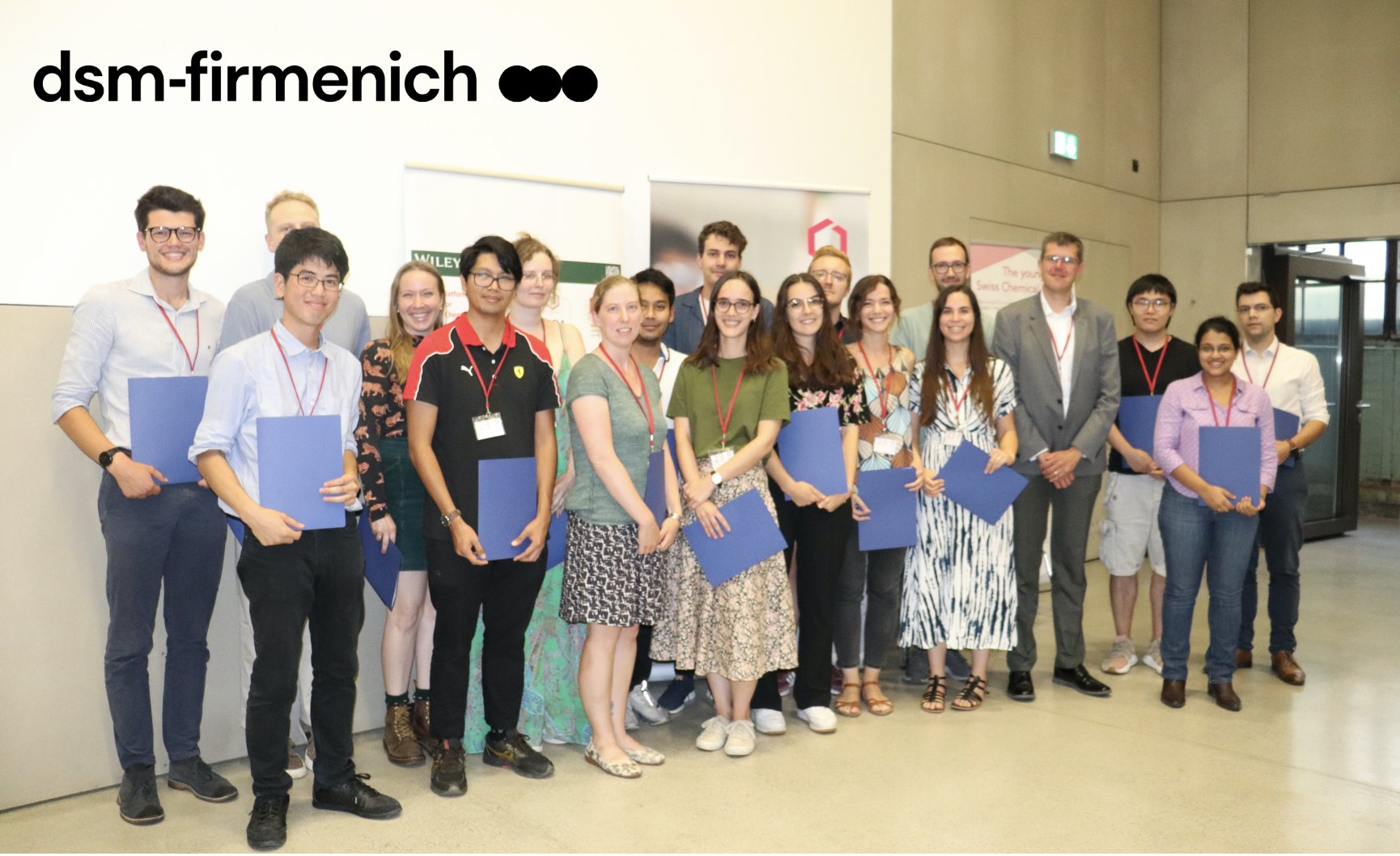
|
Prizes for Winners - certificate and cash contribution of CHF 200.00 Prizes for Runners‘ up |
Céline Wittwer, SCS
12.09.2022
EuChemS Magazine, August 2023
Find our monthly compilation of chemistry- and science-related European policy developments in this newsletter! You will also find EuChemS' activities and news here.
Policy News
- Science collaboration and diplomacy highlighted at informal EU Presidency meeting
- EFSA states glyphosate means no critical concern
- Commission selects global Erasmus+ projects
- ENVI holds hearing on disclosing pesticide toxicity
EuChemS News
- EuChemS Historical Landmarks in Altafulla, Mülheim and Milan
- Athina Anastasaki receives EuChemS Lecture Award
- Antwerp to host ECC10
- EuChemS Executive Board met in June
David Spichiger, SCS
18.08.2023
IChO 2023 Closing Ceremony: more than just winning medals
The 55th International Chemistry Olympiad ended with a closing ceremony on Monday afternoon, 24 July. Out of 348 participants, 217 were awarded gold, silver, or bronze medals. The Swiss team took home an "honourable mention."
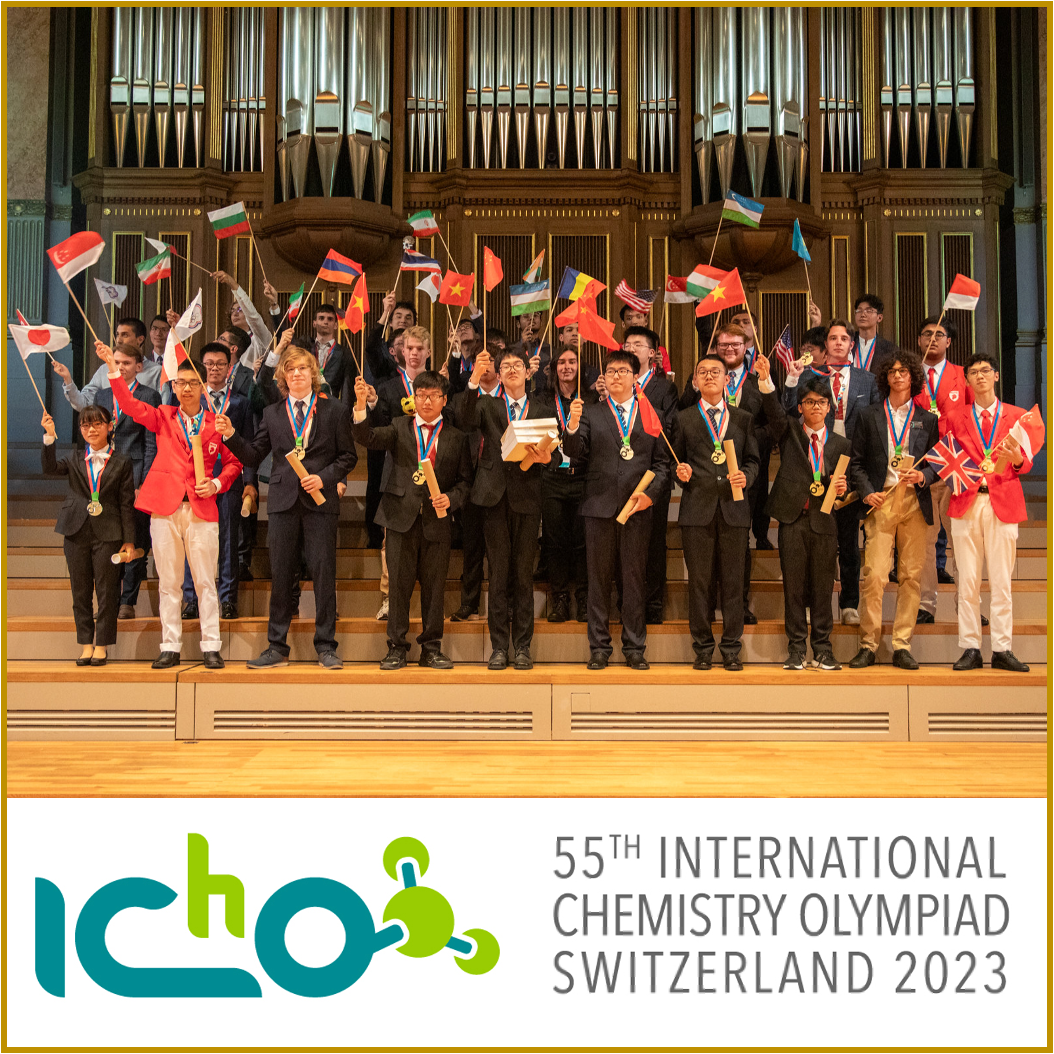 It was a celebration of the natural sciences – or more precisely, chemistry – held last week on ETH Zurich’s Hönggerberg campus. A total of 348 students from 89 countries met for a peaceful competition. They tested their chemistry knowledge in five-hour-long practical and theoretical examinations. The tasks developed by the scientific committee under the direction of ETH professor, Wendelin Stark were quite challenging. "Five hours of practical chemistry in the lab and 5 hours of theory in a row – at a university level – where even the world's best face a big challenge," explains Stark. "I am, therefore, very impressed by the dedication and expertise that the students have shown over the past week." Wendelin Stark, who represented Switzerland at the Chemistry Olympiad in Italy, Norway, and China in 1993, 1994, and 1995 respectively, discovered his love of chemistry through the competition and made contacts that have lasted to throughout his career. Now he hopes that the participants at the IChO 2023 in Switzerland were also able to gain experience that will accompany them throughout their lives.
It was a celebration of the natural sciences – or more precisely, chemistry – held last week on ETH Zurich’s Hönggerberg campus. A total of 348 students from 89 countries met for a peaceful competition. They tested their chemistry knowledge in five-hour-long practical and theoretical examinations. The tasks developed by the scientific committee under the direction of ETH professor, Wendelin Stark were quite challenging. "Five hours of practical chemistry in the lab and 5 hours of theory in a row – at a university level – where even the world's best face a big challenge," explains Stark. "I am, therefore, very impressed by the dedication and expertise that the students have shown over the past week." Wendelin Stark, who represented Switzerland at the Chemistry Olympiad in Italy, Norway, and China in 1993, 1994, and 1995 respectively, discovered his love of chemistry through the competition and made contacts that have lasted to throughout his career. Now he hopes that the participants at the IChO 2023 in Switzerland were also able to gain experience that will accompany them throughout their lives.
Picture galleries of the IChO 2023
Swiss team with a solid result, China won
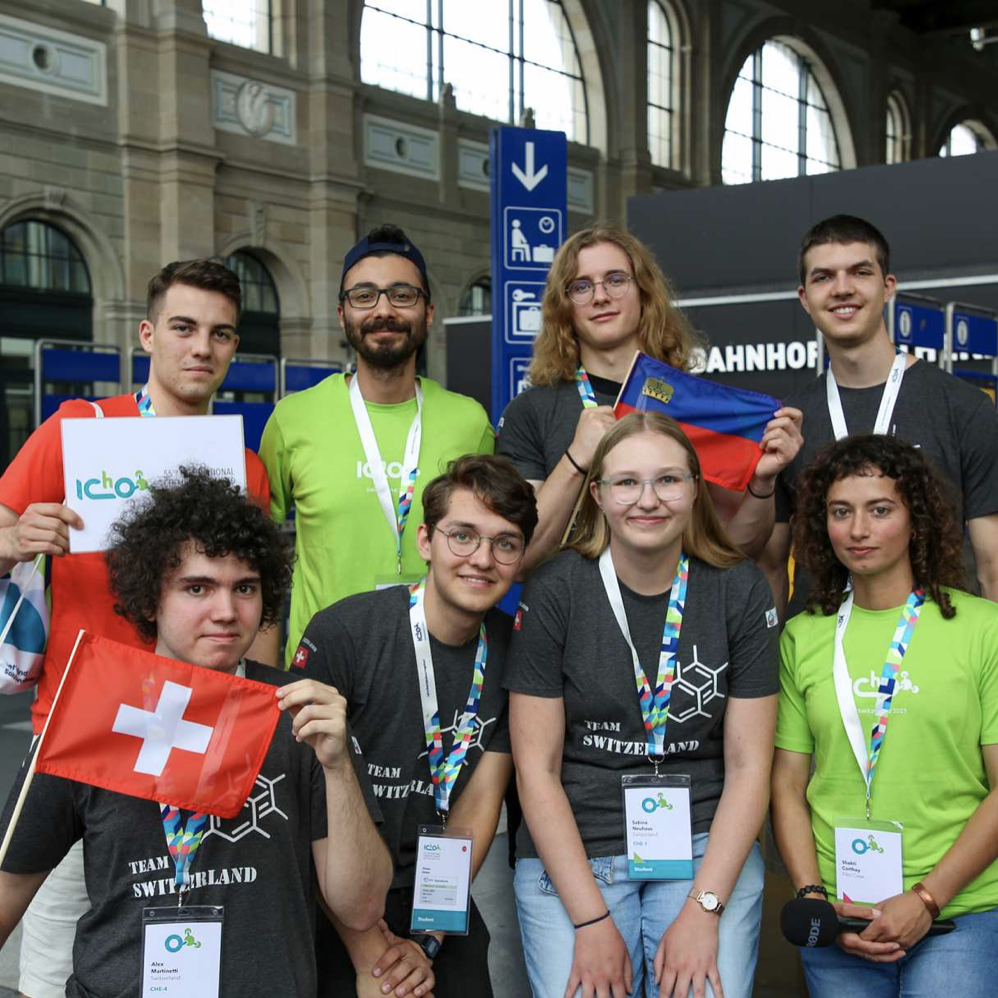 The participants were awarded for their great performance on Monday during the closing ceremony in the Tonhalle Zurich. A total of 217 gold, silver, and bronze medals were awarded. A further 27 candidates received an "honourable mention," including Vivian Huber from Basel-Stadt. The best participant was Weijie Mao from China, who also achieved the best result in both the theoretical and practical examinations.
The participants were awarded for their great performance on Monday during the closing ceremony in the Tonhalle Zurich. A total of 217 gold, silver, and bronze medals were awarded. A further 27 candidates received an "honourable mention," including Vivian Huber from Basel-Stadt. The best participant was Weijie Mao from China, who also achieved the best result in both the theoretical and practical examinations.
The awards were presented by Günther Dissertori, Rector of ETH Zurich and President of IChO 2023, among others. "It was a wonderful experience and a great honour to have these motivated young people from all over the world as our guests at ETH. I think it is great to see their enthusiasm and how much they have learned about chemistry, ETH Zurich and Switzerland!", says Günther Dissertori. "Of course, I hope that we will be able to welcome some of them as students in the future."
Successful event thanks to many volunteers
IChO 2023 was held in Switzerland for the first time and was organized by ETH Zurich’s Department of Chemistry and Applied Biosciences, the Science Olympiad Association, the Swiss Chemistry Olympiad Association, and the Swiss Chemical Society. The event also received support from the Department for Education, Research, and Innovation, as well as numerous partners from the business community and charitable foundations. Marco Gerber, head of the organizing committee, was delighted with the event's success: "We spent two years preparing for this week, and now I am happy that everything worked out so well. We owe this not least to the more than 300 volunteers who put their heart and soul into making the IChO possible!"
Getting to know Switzerland and like-minded people in science
In addition to the exams, the participants had the opportunity to get to know Switzerland and its research through an extensive social program. For example, they visited the Paul Scherrer Institute, Lonza – a site for research and development in manufacturing - in Visp. They went on excursions to the picturesque mountain of Rigi and the old town of Bern - their accompanying persons did not miss out either. They gained an insight into the research work of Swiss Federal Laboratories for Materials Science and Technology (Empa) and Swiss Federal Institute of Aquatic Science and Technology (Eawag), visited Methrom AG – producer of precision instruments for chemical analysis - in Herisau, and enjoyed the view from the Swiss alpine peak, Säntis.
ETH Zurich Editorial Team / IChO 2023
Photograph: ETH Zurich
Opening of the 55th International Chemistry Olympiad (IChO)
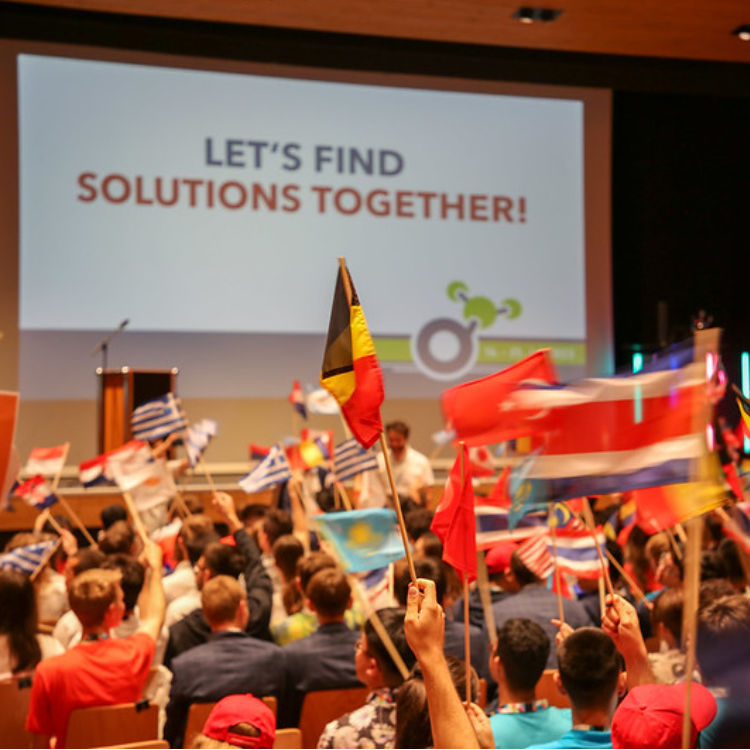 It's all about togetherness!
It's all about togetherness!
What a day: the very first IChO in Switzerland was ceremoniously opened yesterday. The teams from 89 countries gathered in the hall of the hotel Spirgarten in Zurich for the opening ceremony
Günther Dissertori, Rector of ETH Zurich and President of IChO 2023, warmly welcomed all participants and pointed out how valuable and important an event like the IChO is: “The IChO is not just a competition, it is a celebration of knowledge, discovery and the beginning and continuation of friendships. We stand here today, ready to witness the passion of these young chemists with their talents and their dedication. Let us embark on this extraordinary journey together, united by the common language of science and inspired by the possibilities that lie before us for future solutions.”
Helma Wennemers, Professor at the Department of Chemistry an Applied Biosciences, led the opening ceremony and was actively supported by Jane Mumford, a comedian for whom chemistry is now no longer a foreign word! Besides speeches by Silvia Studinger, State Secretariat for Education, Research and Innovation, Gábor Magyarfalvi, International Steering Committee IChO and Wendelin Stark, Head Scientific Committee IChO, each country was introduced with country-specific symbols. The teams were enthusiastic and together with the two Swiss participants Sabine Neuhaus and Alex Martinetti they recited the Olympic IChO oath, which focuses on fair play, inclusion and equality. Overall, the opening was a great success as it was the start of an exciting and eventful IChO period.
Photos of the opening ceremony
David Spichiger, SCS / Source: IChO 2023
17.07.2023
Chemistry Europe Facts and Information for Partner Societies
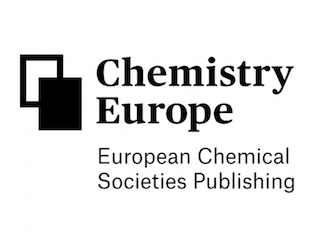 Chemistry Europe is an association of 16 chemical societies from 15 European countries, representing over 75,000 chemists. It publishes a family of high-quality scholarly chemistry journals, covering a very broad range of disciplines.
Chemistry Europe is an association of 16 chemical societies from 15 European countries, representing over 75,000 chemists. It publishes a family of high-quality scholarly chemistry journals, covering a very broad range of disciplines.
The mission of Chemistry Europe is to evaluate, publish, disseminate, and amplify the scientific excellence of chemistry researchers from around the globe in high-quality publications. It supports its members at every stage of their careers as they strive to solve the challenges that impact humankind. In all its work, Chemistry Europe values integrity, openness, diversity, cooperation, and freedom of thought.
ChemistryViews is the science news magazine of Chemistry Europe. It informs about what is happening in the global chemistry community and has a strong focus on the people behind the science.
The Fellows program recognizes members of the Chemistry Europe societies for their outstanding achievements and contributions to Chemistry Europe and their service to at least one member society. It is the highest honor given by Chemistry Europe.
The list of the Swiss CE Fellows is available on the respective SCS award website.
The Chemistry Europe Award recognizes outstanding contributions to chemistry. It includes prize money of EUR 10,000 and a certificate and is open to individuals worldwide, regardless of their affiliation with Chemistry Europe societies.
Chemistry Europe Newsleter (3 per year, free)
Twiter Account: https://twiter.com/ChemEurope
Additional Services for Societies
- Society Volumes (daily updates of the latest articles from a country in Chemistry Europe journals)
- Editor’s Choice (selected articles just published in Chemistry Europe, GDCh, and ACES journals)
- List of Membership Magazines of Chemistry Europe Societies
- Coverage of your Society in ChemistryViews
More Information (for example, on virtual events, special collections, …) on the Hub: htps://chemistry-europe.onlinelibrary.wiley.com/
David Spichiger, SCS / Vera Köster, Wiley-VCH
019.06.2023
Page 20 of 305

